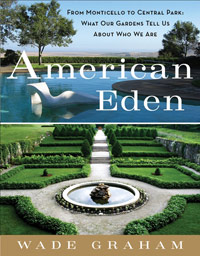American Eden by Wade Graham
New Book Explores the History of Gardens
Growing up in Santa Barbara makes a profound impression on a person. Whether the natural beauty of our city motivates one to find ways to care for the Earth or just to earn enough money to raise one’s children here, a Santa Barbara childhood inevitably leaves its mark. For Wade Graham, the landscape architect, historian, and author of American Eden, the “garden magic” he experienced as a child, roaming through the backyards, parks, and estates of Santa Barbara, fed what became an insatiable desire to understand and appreciate the ways in which humans shape their environment.

His book, subtitled From Monticello to Central Park: What Our Gardens Tell Us About Who We Are, is the most comprehensive and readable history ever written about the men and women who created the environments in which we now live—not just in Santa Barbara, but all over the world. In a wonderfully satisfying narrative full of fascinating characters and vivid descriptions, Graham sets out to explain the modern landscape from its birth in Renaissance Italy through centuries of tradition, modification, and transition. The result is a reading experience that will change the way you look not only at gardens, but also at American history and the hybrid world—part nature, part design—in which we live.
While other scholars have written about and discussed many of the pieces in this giant puzzle of a story, American Eden corrals the whole lot of them and forces them, through a combination of informed description and critical analysis, to yield their secrets. There’s a wonderful chapter on Thomas Jefferson, yes, but there’s also an amazing gallery of other figures, well-known and obscure, who have contributed to making the contemporary world look the way it does. Geniuses of 20th-century California landscape design, such as Thomas Church, Lawrence Halprin, and Daniel Kiley, share in a conversation that includes Andrew Jackson Downing, Charles Platt, and Beatrix Farrand and extends to envelop the imaginative worlds of artists like Robert Smithson and Isamu Noguchi. Over and over, Graham makes the point that even the most apparently inhuman landscapes (check out his grisly description of the wasteland that surrounds the New Jersey side of the Hudson River) are the product of specific individuals and conscious decisions, even if those people and their choices have been rendered invisible by time and ignorance.
It’s an empowering experience to use this book as it was intended—as a way to learn to see and appreciate the making that went into what’s right in front of us. I asked Graham why he wrote this monumental work and his answer was quite simple: “I wrote the book because I wanted to read it. It came out of my own ignorance, and the sense that it gave me that I needed to provide myself and anyone else who was interested with a grammar and syntax to read these ruins around us. I wanted to connect the space I was in to the social meanings it conveys by creating a dictionary to translate the forms embedded in the landscape.”
Whether you are interested in flowers or sustainable agriculture, kitchen gardens or formal estate plans, American Eden will teach you new ways of looking at the Earth. One of Graham’s most remarkable qualities is the consistency with which he tests his enthusiasms and theories against hard facts. He glories in achievements like Montecito’s Lotusland and El Fureidis, which he describes in some detail, but he never loses sight of what they cost—both how expensive they are to create and maintain and in the way they limit the enjoyment of nature to those who can afford it. Still, Graham reminds us that his message is one of healing and of trust. “As a culture we have done violence to the lands we inhabit, but making gardens can be our way of doing something to heal this trauma in nature.”
4•1•1
Wade Graham speaks on Santa Barbara’s gardens and landscapes as part of a panel discussion in conjunction with the Contemporary Arts Forum’s (CAF) ongoing exhibit Eating Apples in Paradise. The talk takes place Saturday, April 2 at 4 p.m. at CAF (721 Paseo Nuevo). American Eden is also available locally at Chaucer’s Books.



